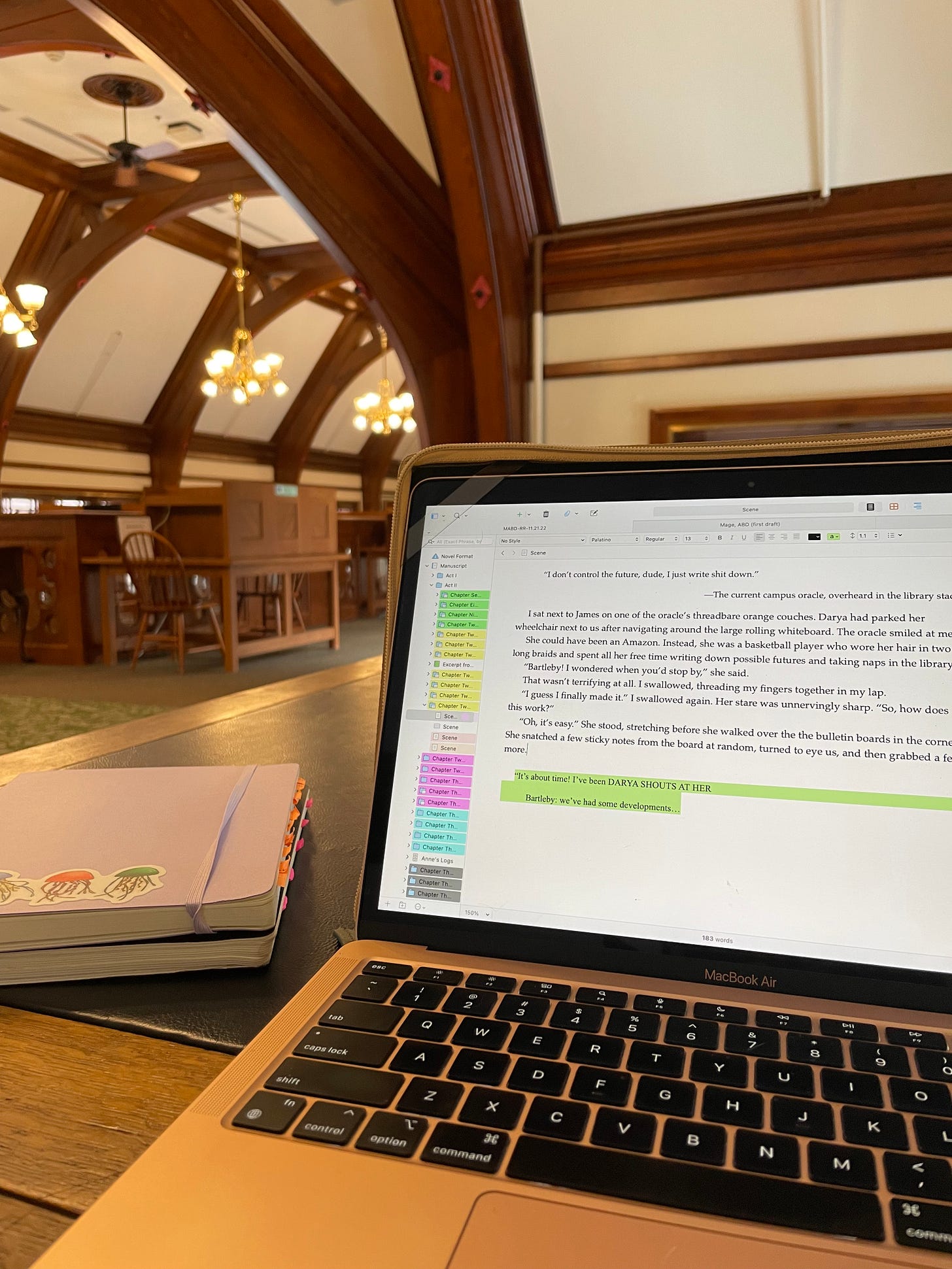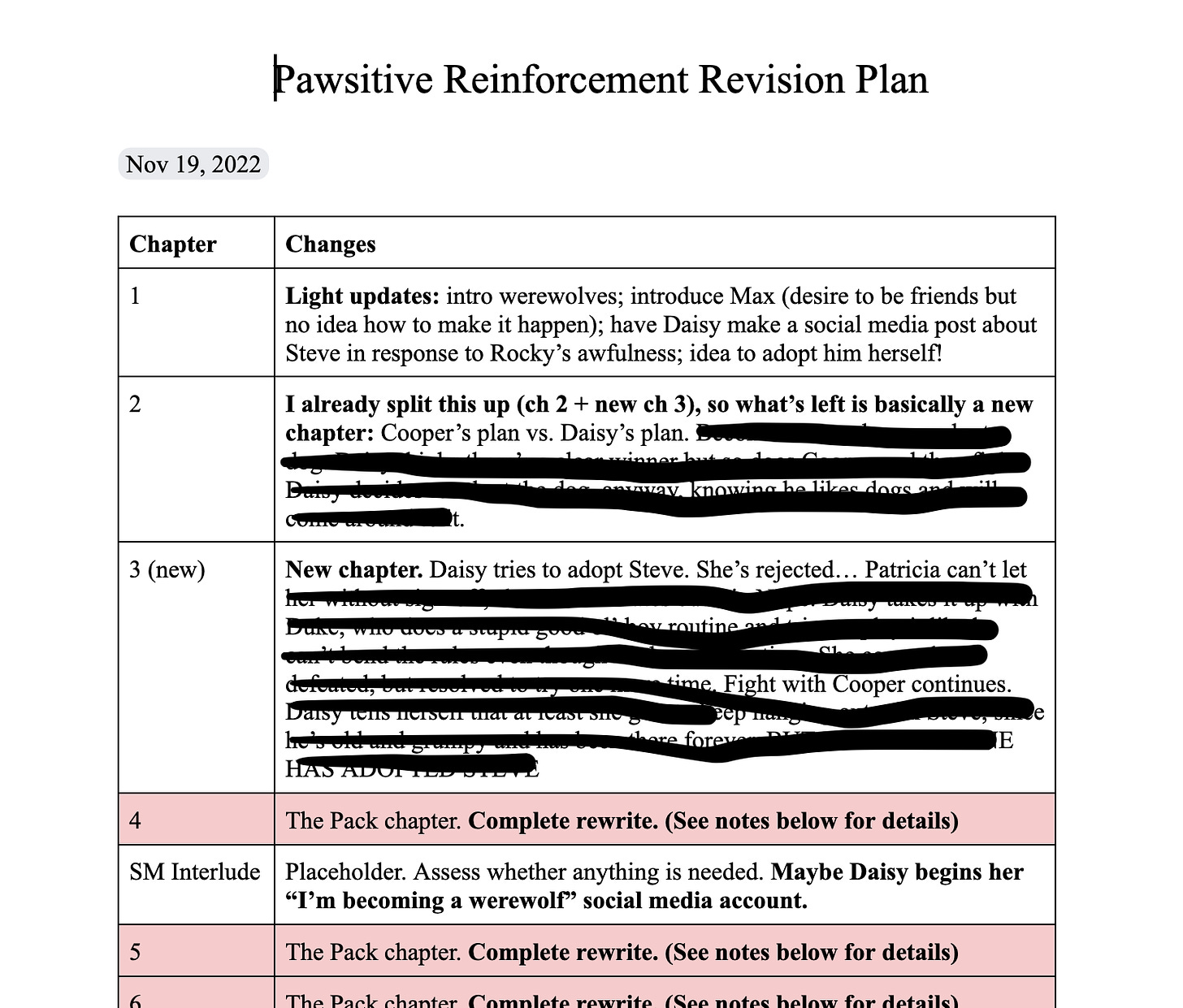Wallowing in Revisions
Revising, revising, revising a novel...
Happy New Year, folks!
I had vague ambitions of writing earlier in the month, but revisions ate up all my time and attention. I’m happy to report, though, that my R&R is with beta readers as I type this, so I’m free, again, to fret about whether or not I ruined the book and repeatedly check my email think about other things.

This month, I wanted to bring you a roundup of thoughts, resources, and tips about revision. Your soundtrack for this newsletter is Cake’s “Open Book,” except the lyrics go she’s revising, revising, revising a novel…
My Revision Process / Recommendations
Over the course of the last year, my revision process has started to click into place. I’d considered myself comfortable with revision—I spent almost a decade teaching college composition as I was writing and revising my own academic work and short stories, after all. But something about revising a novel for the first time made me quake in my proverbial boots.
Here’s what’s made that process more manageable for me. Your miles may vary.
I make note of things I know need to change as I’m drafting.
I do this either in a dedicated project notebook or in a file in my Scrivener project. Every time I hit a roadblock and think I need to go back and change everything, I write a note about revising it instead. This helps me keep momentum as I draft, too.
How do I know what needs to change, you ask? These notes are my instincts. I also gather feedback from beta readers and, if I can, workshops or critique groups.
I will note that I regret not making some of the changes as I wrote for my fluffy werewolf work in progress, because I’m facing down revisions for that and it’s going to be a beast. Pun not intended.
I create an empty, chapter-by-chapter notes document.
When I have a complete draft and I’ve let it sit long enough to be slightly unfamiliar, I re-read it and make notes about what needs to change, adding beta reader or critique feedback and my earlier list.
In my notes, I try to mark out what I think will be new, complete rewrites, or just some simple tweaks and updates.
In earlier revisions, I’ve found a document like this sufficient to orient me when I’m in the thick of it. For my most recent R&R, I also needed a reverse outline, section by section notes, a calendar with major book events, and a slide deck of worldbuilding information. Hence the 40 page doc.
I make a backup of my draft and then create a new document or Scrivener project to do revisions in.
This seems silly, but it’s VERY important. It makes it way easier to commit to any radical reorganization or rewrites I need to do.
I give myself permission to experiment and take risks, knowing that I might make things worse.
Daniel José Older says writing begins with forgiveness. I think revision does, too.
Once I have a complete MS, revision feels like pulling apart a puzzle and trying to add handfuls of pieces from other puzzle to it in a cohesive way. That’s scary. Things will go wrong. That has to be okay, or else I’ll get stuck.
I move between word processors, pen and ink, and other formats as needed.
I’ve found it helpful to move chunks of my book out of Scrivener into a Word doc to make changes. In Word, I can also use text-to-speech to experience my words in a different sensory way. It is extremely helpful. I’ve also compiled chunks of my book into ePub to read as I completed acts or phases, to make sure things were flowing.
This is more of an aspirational / accidental step, but I plan self-care, because this process is hard.
I just happened to be doing a 30 day yoga challenge while wrapping up this R&R, and it literally made it possible for me to keep going.
In the past, I’ve also built in self-bribes — little things like fountain pens or stickers or snacks to reward myself for all the hard work.
This really is hard. You aren’t just imagining it. You’re in editing mode, and looking at your work with a critical eye. You’re second-guessing earlier choices. It can be a hard mindset to inhabit, and because revision is—at least for me—a slow process, you might be in this mindset for a long time.
Another aspirational step: I build in celebrations. Every single draft is a milestone. You should be proud.
I am terrible at this, friends.
Finally, I make time to recover.
After the jubilation of finishing fades, the crash comes. Maybe this is an artifact of not building in enough time for self care, or of being so critical of my work for so long, but I sometimes hit a wall where I suddenly can’t write for a little while. I have ideas, but everything feels like too much work, and like it’s beyond my ability to pull off. It passes. And it passes faster if I fill the well — you can’t just be all output all the time. You need to soak things in, once in a while.
Resources
A friend of mine recommended Matt Bell’s Refuse to be Done right as I was easing in to Mage, All But Dissertation revisions for the first time last year. It’s a wonderful book, even if you don’t do all the things. (I did partial rewrites, but not a full from scratch rewrite of my MS as Bell suggests.)
I also found Jane Friedman’s 7 Steps for Tackling a Revise and Resubmit (R&R) super helpful.
Recommendations
The only book I managed to read this month (besides my own, several times in a row sob) was Zoraida Córdova’s The Inheritance of Orquídea Divina. It’s a beautiful, sweeping family saga in omniscient POV and I’m going to be thinking about it for a long, long time.
I also want to recommend an excellent Cat Rambo Academy for Wayward Writers course: John Wiswell’s Wrangling Short Stories blew my mind in the best way. I have some new tools to try out on my pile of unfinished short stories and I’m so excited! If you have a chance to take this, do it!
That’s it from me this month, folks.
Thank you for wallowing with me!
Courtney
